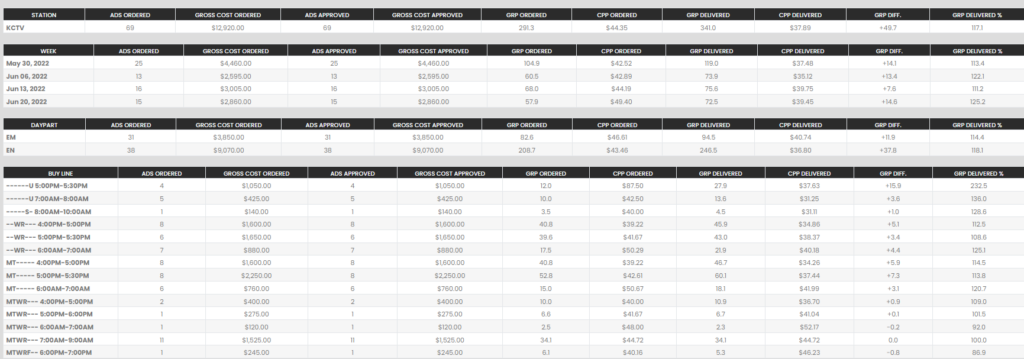
Principal – DW Creative Marketing
Dave Wieser is Principal of DW Creative Marketing, whose mission is to “Help the Doers create their legacy.” His career of 20+ years in the advertising and marketing industry has led to a wide range of experiential roles, including media selling, media buying/planning, marketing strategy, research, business intelligence and data analytics…
Your business is at a point where considering a higher investment in advertising is on the table. You see the potential for a much larger audience becoming familiar with your company and media reps are pounding on your door. But you are unsure of whether you should handle the media buying in-house, or hire a media buying agency. Let’s assume you’d like to explore the path of hiring an agency.
One of the most common questions at this stage is, “How do I hire a media buying agency? What questions should I be asking and where are the red flags?”
The world of media buying can be a complex maze to navigate on your own, and now there’s an added step of how to go about hiring a partner.
This article should take you through the key questions to consider when evaluating options. While we understand that referrals from business colleagues will be your first step, make sure to fully vet all potential partners.
What tools do you use to help plan and buy your media?
An element of media buying process involves complex task of evaluation of seemingly commoditized media vendors. A good buyer must dig deep to uncover each vendor’s strengths, weaknesses, audience composition, rating trends, and rate/cost competitiveness. If a potential partner does not use software to plan/buy media, that should be considered a red flag.
Examples of Media Buying Software
Media buying software streamlines the process of purchasing advertising inventory, saving businesses significant time and resources. It also provides data-driven insights to optimize ad placements, improve audience targeting, and enhance overall campaign performance.
Tools such as Strata/Freewheel or Gale Force Media have the needed aforementioned metrics at your fingertips, saving a buyer countless hours.
Both simplify the media buying process and offer robust tools for audience targeting, campaign management, and data-driven decision to help aid your agency in maximizing ROI.

Examples of Media Buying Research
Media buying research is crucial as it helps businesses understand where their target audience is most active, ensuring that advertisements are placed on the most effective platforms for maximum reach and engagement. Here are a few we use regularly:
- Scarborough Research offers a wide range of data on consumer behavior, media habits, and demographics, allowing businesses to develop targeted marketing strategies. The company’s syndicated research provides detailed insights into local markets across the U.S.
- Marshall Marketing Research, on the other hand, provides customized research solutions to meet the specific needs of individual businesses. They specialize in conducting surveys, focus groups, and in-depth interviews, offering businesses a deeper understanding of their customers’ needs and preferences.
- Kantar Research provides valuable insights into consumer behavior, market trends, and industry dynamics, helping businesses make informed strategic decisions and optimize their marketing strategies. We love using it for competitive spending to inform a strategy of “buying around” the competition, to level the playing field from competitors’ with larger budgets.
What tools do you use to reconcile and post buys?
Aside from whether the campaign “worked,” at a minimum you should understand if you got what you paid for. In other words, did everything run as ordered?
This leads us to two critical roles your media buying partner separate needs to deliver: reconciliation and post-buy analysis.
- Reconciliation is the reoccurring “audit” that confirms all commercials ran as ordered.
- Post-Buy Analysis is the reoccurring “audit” that summarizes delivery, typically in the form of gross rating points or impressions. Did you buy 100 Gross Rating points – how many were delivered? If under the industry standard of 90%, you should be entitled to “bonus” commercials.
Please note that without software, this would be an incredibly tedious process, if not altogether unfeasible. We are shocked at the number of “media buyers” who do not properly reconcile invoices or perform post-buy analysis. Even worse, some rely on their “media partners” to provide the reports, an obvious conflict of interest.

What is your buying “style?”
Think of a negotiating style spectrum: one side yearns for a rosy partnership between the media buyer and rep, almost bordering friendship, ripe with martini lunches and invites to exclusive station events. We call them the “Chummy Buyer.” It’s important for the Chummy Buyer to have great relationships with the reps and stations, however, it may come at the expense of paying higher rates or avoiding uncomfortable negotiations so as not to disrupt a relationship.
The other side of the spectrum depicts a media buyer that has no regard for the emotional well-being of the rep, its managers, or media partner. We call them the “Brute Force” buyer. In his eyes, there is only one goal – we get the lowest rate and it better be the lowest rate or else. We’re not going to go into the long-term consequences of the “Brute Force” buyer, but you can draw your own conclusions.
This “style” question may be an irrelevant question for some businesses, but those who wish to ensure their buying partner acts in accordance with the company’s brand standards and principle, it’s an important discussion when considering who to hire.
What experience does the media buyer have who is responsible for our placement?
As with any industry, you will have levels of competence. Typically, we find buyers in four buckets:
- Legacy Media Buyers – Years of experience in all types of media and highly competent. They can quickly put a buy together, have connections at most media and are typically responsible for pushing out a large number of buys, quickly, for multiple clients. They know their stuff, but the one drawback is that they haven’t sold media or know the inner-workings of the ad-publishing ecosystem.
- Junior Media Buyers – Limited experience and often promoted from intern to help the Legacy Buyer. These buyers are a bit cumbersome (they’re green!) and still lack the experience to understand how to navigate the complexities of the advertising industry, potentially leading to ineffective targeting and wasted ad spend. Additionally, their lack of industry knowledge and relationships may limit their ability to negotiate favorable deals and secure optimal placements for their clients.
- “I sold it” Media Biased Buyers – These are buyers who may have experience selling radio, TV, direct mail, etc, but typically only push for a particular media on a plan. This could be a double-edge sword – the benefit is you know they are most likely getting you the best deal for said media and making the dollar go far, taking advantage of the “inner-workings” of said media. On the other hand, Americans don’t just use one media! Consequently, the plan could be incomplete at best, or worse, ineffective.
- Media Buyers from Media Sellers – Cream of the crop. Those who have sold multiple types of local media, know the inner workings of each, have a robust rolodex of media contacts and can put buys together that work over a handful of different media. Seek out these buyers because they can ask questions legacy buyers may not even think to ask, further leveraging your media dollar.
Do you have experience buying for others in our industry?
We think this is the least important of the five and here’s why; Just because it worked in one market, there is no guarantee a “rubber-stamped” plan will work in another, regardless of the category.
However, your media partner must be an expert in your category/industry, target audience, and expectations on outcome metrics. Hiring a partner that has experience in your industry can expedite the strategic process, eliminating the step of “teaching” your media agency about the fundamentals of your business.
How to Hire a Media Buying Agency Summary
When hiring a media buying agency, it’s essential to consider their use of media buying software and research tools, their reconciliation and post-buy analysis methods, their buying style, the experience of the media buyer, and their industry-specific experience. These factors can help ensure that the agency can effectively navigate the complex process of purchasing advertising inventory and maximize ROI. It’s also crucial that they align with your company’s brand standards and understand your industry. A successful media buying partnership is built on trust, communication, and shared goals.
